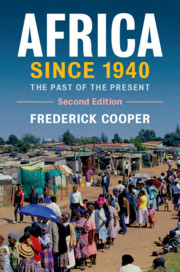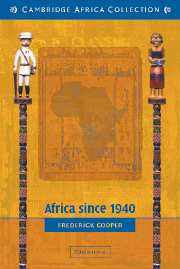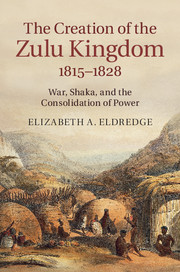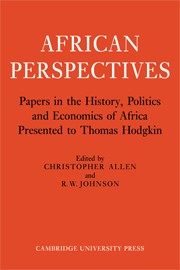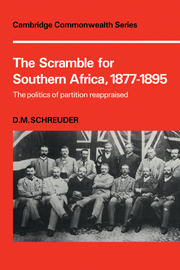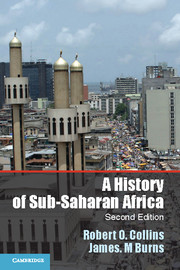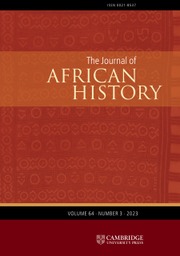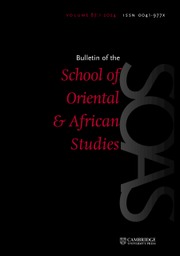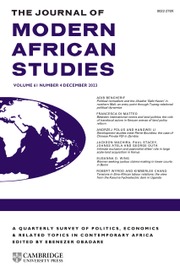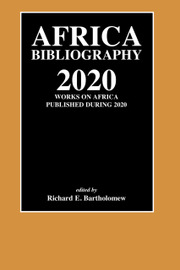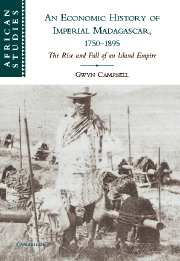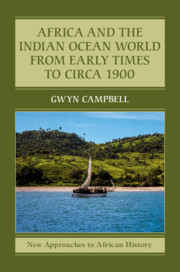Africa since 1940
The Past of the Present
2nd Edition
Part of New Approaches to African History
- Author: Frederick Cooper, New York University
- Date Published: July 2019
- availability: In stock
- format: Paperback
- isbn: 9781108727891
Paperback
-
Africa since 1940 is the flagship textbook in Cambridge University Press' New Approaches to African History series. Now revised to include the history and scholarship of Africa since the turn of the millennium, this important book continues to help students understand the process out of which Africa's position in the world has emerged. A history of decolonisation and independence, it allows readers to see just what political independence did and did not signify, and how men and women, peasants and workers, religious and local leaders sought to refashion the way they lived, worked and interacted with each other. Covering the transformation of Africa from a continent marked by colonisation to one of independent states, Frederick Cooper follows the 'development question' across time, seeing how first colonial regimes and then African elites sought to transform African society in their own ways. He shows how people in cities and villages tried to make their way in an unequal world, through times of hope, despair, renewed possibilities, and continued uncertainties. Looking beyond the debate over what or who may be to blame, Cooper explores alternatives for the future.
Read more- Ideal for courses on political science and 'Introduction to Africa' courses, and presumes no prior knowledge
- Revisions to this edition are fully integrated into the existing structure, including new events and recent scholarship
- Contains more emphasis on the ups and downs of African economies, and on the contrast between the political, social, and economic trajectories of different parts of Africa
- The existing cases have been updated, and new cases introduced
Reviews & endorsements
'Cooper’s new edition, with its profound and stimulating exploration of Africa’s post-2000 spurts of growth, documents links to the preceding eras of post-colonial development and neoliberal disinvestment. He portrays African citizens, though enmeshed in a network of world affairs, as finding new ways to cope with the continent’s possibilities and restraints.' Patrick Manning, University of Pittsburgh
See more reviews'Not once, but now twice, Cooper has performed that rare trick of producing a genuinely introductory text for the beginner that also excites seasoned scholars with its interpretive depth and flair. Not content with simply tacking on an 'update' chapter in this second edition, he has also refreshed 'old' chapters and their bibliographies. Maps, figures, and pictures are superb.' John Lonsdale, University of Cambridge
'Cooper's survey is the most thorough, artful, and compelling text available on Africa's late-colonial and post-colonial history. Africa since 1940 combines a masterful historical narrative with an acute and insightful examination of the continent's troubled politics. This new and significantly updated edition is the place to start for any reader wishing to understand the dynamics of Africa's recent past.' David M. Anderson, University of Warwick
'Frederick Cooper’s brilliant Africa since 1940 was by far the most popular book in Cambridge’s New Approaches to African History series. Now, he presents a revised, much expanded, and original second edition, which not only updates to the present the story he tells, but expands his analysis. This is once again the most perceptive critique of Africa’s recent history.' Martin Klein, University of Toronto
'When Africa since 1940 was first published, it was a major event: here was a comprehensive introduction to twentieth-century African history that actually proffered new and important arguments linking the colonial and independence eras. It is the only introductory text I’ve considered using. Thoroughly updated, including a survey of post-2000 developments - covering epoch-shaping events such as the ‘Africa rising’ narrative, militant Islam, democracy and reform in states like Ethiopia, and much more - Africa since 1940 remains an essential read for teachers, students, and anyone interested in Africa’s past and present.' Daniel Magaziner, Yale University, Connecticut
'Africa has often appeared as a monolithic entity, both in popular imaginations, and in academic and policy discourses - a place marked by a history of colonialism, poverty, and violence. In this measured and rigorously researched text on the continent’s history from the 1940s to the present, Frederick Cooper argues powerfully against the tendency to read Africa reductively, thereby occluding a rich history of possibilities. All students of the continent - beginners and specialists alike - will profit immensely from this work.' Andreas Eckert, Humboldt-Universität zu Berlin
'Once more, Frederick Cooper helps us rediscover how the urban and rural people of Africa struggled to understand and refashion their way to independence, in spite of tremendous difficulties. A clear and lucid book for all readers.' Catherine Coquery-Vidrovitch, Université Paris Diderot
'Since its publication in 2002, Africa since 1940 has been the most indispensable book in the field of African history. It is a useful textbook for students, and I’ve enjoyed teaching from it for years. But, more importantly, it set out a coherent, capacious analytic with which to see Africa’s past. In this revised and updated edition, there are new themes - religion and gender, among others - that allow a more capacious view. There is an expanded and enriched geographic scope. And there is a whole new chapter about twenty-first-century Africa, allowing Cooper to describe the fate of the ‘gatekeeper state’ up to recent times. Now more than ever, Cooper’s clear-headed, unromantic, synthetic, far-seeing book is essential. It furnishes all of us students of Africa’s past with a shared vocabulary to think about history and the future.' Derek R. Peterson, University of Michigan
'Cooper has an extraordinary ability to synthesize the vast and discordant evidence of change in Africa since 1940. Since 1940, Africa has witnessed periods of enthusiastic expectations for development, and periods of wrenching disappointments. Since 1960, Africa’s population has tripled, propelling youth into the forefront of change even as aging leaders refuse to yield power. Since the 1990s, parts of Africa have experienced high economic growth fueled by demand for raw materials. As Cooper notes, such growth may be part of long-established short-term spurts and does not necessarily translate as development. Cooper reminds us that there are many Africas and many trajectories of change. The new edition has been updated to reflect on these and other changes and it remains the standard for understanding modern African history.' Richard Roberts, Stanford University, California
‘This educational book, which discusses important concepts while presenting the major axes of the recent history of continent, is an excellent introduction to the history contemporary of Africa.’ Claire Nicolas
Customer reviews
Not yet reviewed
Be the first to review
Review was not posted due to profanity
×Product details
- Edition: 2nd Edition
- Date Published: July 2019
- format: Paperback
- isbn: 9781108727891
- length: 336 pages
- dimensions: 228 x 152 x 17 mm
- weight: 0.52kg
- contains: 41 b/w illus. 4 maps
- availability: In stock
Table of Contents
1. Introduction
2. Workers, peasants, and the challenge to colonial rule
3. Citizenship, self-government, and development: the possibilities of the post-war moment
4. Ending empire and imagining the future
Interlude: rhythms of change in the post-war world
5. Development and disappointment: economic and social change in an unequal world, 1945–2018
6. White rule, armed struggle, and beyond
7. The recurrent crises of the gatekeeper state
8. Twenty-first century Africa
Index.
Sorry, this resource is locked
Please register or sign in to request access. If you are having problems accessing these resources please email [email protected]
Register Sign in» Proceed
You are now leaving the Cambridge University Press website. Your eBook purchase and download will be completed by our partner www.ebooks.com. Please see the permission section of the www.ebooks.com catalogue page for details of the print & copy limits on our eBooks.
Continue ×Are you sure you want to delete your account?
This cannot be undone.
Thank you for your feedback which will help us improve our service.
If you requested a response, we will make sure to get back to you shortly.
×
